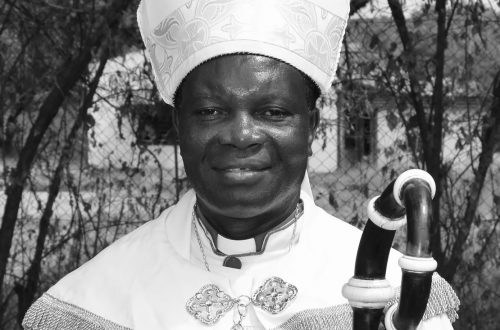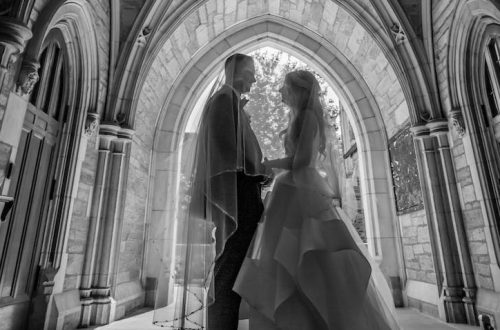 We discussed Mother Teresa’s “dark night of the soul” earlier this week. It’s also the topic of conversation at the Washington Post‘s “On Faith” blog. Dr. Albert Mohler has weighed in on the matter, and here is what he concludes:
We discussed Mother Teresa’s “dark night of the soul” earlier this week. It’s also the topic of conversation at the Washington Post‘s “On Faith” blog. Dr. Albert Mohler has weighed in on the matter, and here is what he concludes:
“As an evangelical Christian, I have to be concerned that part of Mother Teresa’s struggle was that she did not consider herself worthy of salvation. She was certainly not worthy of salvation. Nor am I. Nor is any sinner. The essence of the Gospel is that none is worthy of salvation. That is what makes salvation all about grace. As the Apostle Paul taught us, the wonder of God’s grace is that while we were sinners, Christ died for us.
“Our confidence is in Christ, not in ourselves. We are weak; He is strong. We fluctuate; He is constant. We cannot trust our feelings nor our emotional state. We trust in Christ. Those who come to Christ by faith are not kept unto him by our faith, but by his faithfulness.
“I possess no ability to read Mother Teresa’s heart, but I do sincerely hope that her faith was in Christ, and not in her own faithfulness.”
“Trust Christ, Not Feelings” – by Albert Mohler (On Faith)




18 Comments
Carlito
Mohler is so money, he doesn’t even know it….
Ken
Mohler is so money, he doesn’t even know it….
I thought I was a native speaker of English. Now I’m not sure.
scott
when i read the article with some of mother teresa’s letters, there were times when i wanted to remind her of the gospel… i wonder if her dark night was at all like martin luther’s before the gospel was made clear to him in a new way…
Ken
I looked it up. Apparently “money” means “hip, suave, or cool.”
Which, needing to look such things up, obviously I am not.
Bryan L
Go to Calcutta and minister among the poorest of the poor and see how you feel and what you begin to think.
Carlito
Ken – haha.. hilarious!
Bryan L – I appreciate your comments – they keep me honest and on my toes.. I understand what you’re saying to a degree, but I’m not sure I follow your logic.. What about all of the missionaries who have suffered brutally and seen the most horrific things in far-away lands – and yet gave glory to God with their legacies of faith – which are a testimony to God’s power and love and mercy in the midst of a needy and dying world? I’m thinking about people like Dietrich Bonhoeffer, Elizabeth Elliot, Hudson Taylor, and the list goes on….
And what about the descriptions of the heroes of the faith in Hebrews 11?
Last, but not least, the Apostle Paul’s own description of his ministry in 2 Corinthians 11 is filled with accounts of beatings, shipwrecks, lashings, stonings, etc. etc. And what does he say in response to these things? >>> 30If I must boast, I will boast of the things that show my weakness. 31The God and Father of the Lord Jesus, who is to be praised forever, knows that I am not lying.
So ultimately, with God, who is the author AND perfector of our faith: all things are possible. Our own good will and humanitarian efforts are simply not enough.
Bryan L
I’m sorry Carlito but I don’t see what you are arguing for. What are you implying about Mother Teresa from what you wrote?
Please elaborate.
Thanks.
Blessings,
Bryan L
Carlito
Bryan L – My response was to your first post, which I interpreted as an implication that if the people reading this blog were to go to Calcutta and minister among the poorest of the poor, that we would lose hope in God and His presence as seems to have happened to Mother Teresa.
Is that a wrong assumption? Before responding to post #7, I want to make sure that I understand you correctly. Can you please elaborate on what you meant by your first post? It was a short post and seemed a bit inflammatory to me, so that’s why I responded to it…
Thanks man!
In Christ,
Carlito
Bryan L
My point was not that they would, but that it’s understandable that she might not feel God’s presence.
From reading the actual Time article I don’t see Mother Teresa’s salvation ever being a thing she wrestled with. That’s why I’m surprised to see Mohler bring it up.
She seems to be mainly struggling with two things:
1. A loss of the feeling of God’s presence.
2. Not being worthy of the call and attention that she was receiving.
It seems like some are pointing their fingers at her and looking down on her for feeling the way she did. And worse acting like we wouldn’t feel any different or that our theology would naturally sustain us and comfort us. Maybe it would, but maybe not. But until we’ve walked her shoes we have no place to really say anything. Seriously she was in Calcutta for like 50 years. And even in spite of not feeling God’s presence so much she continued to serve him wholeheartedly. She even suggest at one point that her experience will continue into eternity. The fact that she thought eternity might have consisted of God’s absence as well and she continued to serve him anyway; that’s beautiful and humbling.
Her concern over and over seems to be the Glory of God, that Jesus would be magnified and she would become less. In fact this the reason she never wanted those letters released (how would you like if people reas your most private thoughts and confessions?). She says “I want the work to remain only His.” If the letters became public, she explained to Picachy, “people will think more of me — less of Jesus.”
I’m just saying cut her some slack and show a little bit of compassion.
Blessings,
Bryan L
Kris
That Bryan L, he’s money and doesn’t even know it.
Good thoughs Bryan.
bj
Rick Phillips has a great article on the reformation21.org site on an evangelical response to this.
Carlito
Bryan L – I agree that nobody can judge Mother Teresa’s heart and passion, or the things that she struggled with. As the old adage goes, only God knows the heart of a person. Every story like this is unique, and her sacrifice and compassion were indeed nothing short of amazing. We should celebrate her work and ministry and be thankful for the impact she had on the world for the Kingdom – as we should for ALL missionaries, not just the ones on the “Pass it on†billboards and CNN.
As for her struggles and doubt, who doesn’t struggle and doubt at times (especially in the midst of a trying ministry)? We can’t make blanket judgments about her ministry for obvious reasons. As I said in my comments in the other article Denny posted about MT, faith is the most difficult thing in the world and it’s easy to let our feelings dictate our view of our relationship to God, rather than truth. No one is immune to that. As the boy’s father in Mark 9 said, “I believe! Help my unbelief!â€. That should be the cry of all our hearts as we fight the good fight of faith.
I will say that I believe Mohler’s main concern is the ramifications and reaction to this story regarding the nature of our relationship with God – i.e. faith/grace vs. works. As I’ve stated in my posts on Denny’s other MT article, I believe the dangers of Catholicism are works vs. grace – i.e. putting works in front of grace rather than vice versa – which inevitably leads to guilt and condemnation because we can never do enough to meet the perfect standard of Christ. I think it’s healthy to reinforce the fact that it is indeed God who sustains our faith, and every ounce of it comes from Him through the finished work of the cross. That’s where I think Mohler’s words ring true and provide a solid foundation for those who might have questions about how MT’s struggles should apply to our lives.
So, at the end of the day, I believe we’re on the same page. As with all of our dialogues, I think we’re just coming from different perspectives. And I think that’s a good thing.
In Christ,
Carlito
Carlito
P.S. next-to-last paragraph, third sentence – should read “…finished work of Christ on the cross.”
It’s probabably understood, but just wanted to clarify 🙂
Bryan L
Carlito,
Good thoughts.
One thing you mentioned though brought something up in my mind. You said, “As I’ve stated in my posts on Denny’s other MT article, I believe the dangers of Catholicism are works vs. grace – i.e. putting works in front of grace rather than vice versa – which inevitably leads to guilt and condemnation because we can never do enough to meet the perfect standard of Christ.”
What’s funny though is that I haven’t really met any Catholics that ever even think along those lines. My whole family is catholic and being Mexican it’s also pretty common in our culture. Yet I never run across catholics thinking that their good works will get them to heaven. I never even run across any Catholics that question whether they will or not go to heaven. In fact some time it seems to me like the catholics I know believe in the grace of God more than the protestants I know. How funny.
Also I hear you concerns about the article concerning Catholicism and the whole grace vs faith thing in there. But I don’t really see that being an issue at all in the article. Truthfully it seems like something we put into their and assumed was an issue because of out views of Catholics. What did you read in the article that made you think what you did and have the concerns you did about it? What did she say that made you think that way.
I wonder this because truthfully after I read the article I was inspired and comforted.
Blessings,
Bryan L
Jonathan Moorhead
I doubt the RC church would consider MT for the sainthood if she wasn’t totally sold on the RC idea that one contributes to one’s salvation. It doesn’t matter if she was in Calcutta or California, there is no wonder she didn’t feel the presence of God.
Wonders for Oyarsa
Yup – just goes to show what happens when you’re a Catholic. You have periods of darkness and doubt. If only she had Protestant theology, none of this would happen.
This is pathetic, folks.
Carlito
Wonders – the issue here is larger than “oh, she’s just a Catholic”.. We’re talking about theology providing a foundation for how we live and serve God and serve others – either in the States or Calcutta or Haiti.
The knowledge of God and our view of His nature and attributes- including how He works, how He saves, and how He relates to His creatures – has profound implications on our ministry and service to the Kingdom over the long haul.
i.e. is grace really grace, or do I have to earn God’s favor? If I have to earn it, I’m going to feel like I need to save the world or else God will not be satisfied. If I’m trying to save the world thinking that I must perform at a certain level to meet a certain standard, we all might as well give up on the faith entirely.
Once again, I’m not claiming to judge MT’s heart, I’m just saying that we all can learn lessons from the struggles of another. Legalism is subtle, friend, and those of us in the Protestant world are just as prone to condemnation or self-righteousness, as any Catholic. However, the more we hold to the gospel of grace and our receiving God’s riches at Christ’s expense, the more freedom we will have in performing ministry that is motivated by joy and not obligation.
Wonders for Oyarsa
Carlito,
There are other sources to spiritual darkness than faulty theology. Those who rest in God’s grace may still face the utter agony of not feeling his presence. The proof of this is Christ – our model. His suffering and doubt in the garden and on the cross were not the fruit of subtle bad theology – they were part of what it means to be human and what it means to suffer on behalf of God’s people.